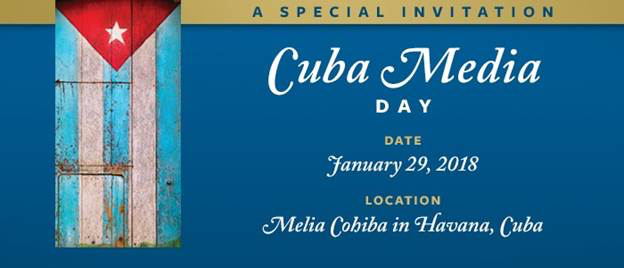CUBA STANDARD — As red-hot U.S. travel to Cuba has cooled to orange level in the last months of 2017, 30-plus U.S. travel business executives are trying to get the message across that plenty of legal venues for travel to Cuba continue to be open, and that the island is as safe and welcoming to Americans as ever, politics notwithstanding.
A week before a “Cuba Media Day” at the Meliá Cohiba hotel in Havana Jan. 29, 14 journalists — representing travel publications Condé Nast and Travel Weekly, among others — had registered for the event.
The Meliá Cohiba is located near two hotels where Trump administration officials claim some of the mysterious “sonic attacks” against U.S. diplomats occurred.
The U.S. government has not only prohibited individual travel under the educational category — the one most frequently chosen by U.S. solo travelers — but the U.S. Department of State also issued a travel warning for Cuba in September, following allegations of “attacks” against U.S. diplomats in Havana who have reportedly suffered a variety of symptoms.
Cuba stopped publishing travel statistics in December 2016, but officials said that after fast growth through summer 2017, visitor arrivals in September, November and December dropped below year-ago levels.
The Cuba Media Day organizers are trying to get across that travel is still legal for Americans, and that Cuba is a safe destination.

“Despite headlines stating that travel to Cuba is now harder due to new restrictions, U.S. travelers can travel to Cuba in much the same way as they did before,” Tom Popper, founder of tour operator Insight Cuba and organizer of the event, told participants in an email.
While the Trump administration’s stated goal is to eliminate individual travel, “all 12 categories of travel remain, and any American can still legally travel to Cuba under the popular people-to-people category, provided they do so with a company authorized in people-to-people travel,” Popper added.
While the new U.S. regulations block individual travel under the “educational” people-to-people category, some say Americans can still legally travel solo under the “Support of the Cuban People” category. However, the way how U.S. sanctions enforcers handle this category has regime-change connotations and is politically sensitive for Cuban authorities. Lindsey Frank, an attorney with law firm RBSKL, is scheduled to brief participants at the Cuba Media Day regarding this option.
Although Canadian diplomats apparently suffered mysterious health symptoms as well, the United States is the only nation that has issued a travel warning for Cuba.
“Cuba maintains its reputation as a safe destination,” Popper said. “According to the U.S. Department of State, none of the 4.5 million visitors to Cuba in 2017, including 650,000 Americans, experienced confirmed symptoms resulting from the alleged incidents.”
International tourism players underlined this argument by awarding Cuba the title “safest destination” at the recent annual FITur travel fair in Madrid.

“Cuba has long been thought of as a safe destination due to extraordinarily low crime rates, mainly related to occasional pickpocketing and petty theft,” Popper said.

